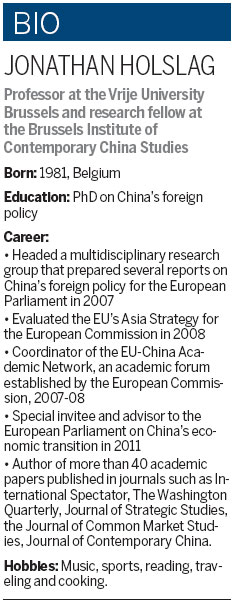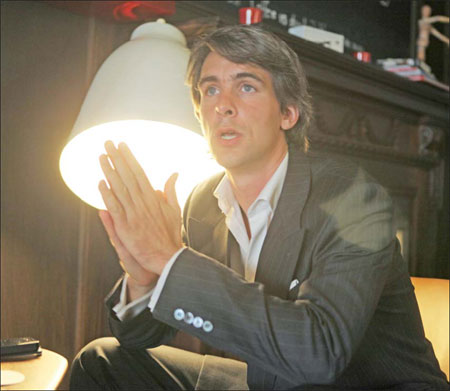Warnings from a bell ringer
Updated: 2012-09-14 09:51
By Fu Jing (China Daily)
|
|||||||||||
|
Jonathan Holslag is often referred to as the youngest China hand in Brussels. Fu Jing / China Daily |
China and europe need to work together to steady their rocky relationship, Belgian expert says
For someone so young, it takes a lot of courage to candidly say that Europe and China share a "fragile relationship" and lack cohesion on major international issues.
 |
Jonathan Holslag, 31, the man in question, is often referred to as the youngest China hand in Brussels, and someone whose academic instincts have led him to frequently challenge the maturity of the so-called comprehensive strategic partnership between Beijing and Brussels.
"It is a technical partnership and not a strategic alliance in the first place," says Holslag, a professor at the Vrije University in Brussels and a research fellow at the Brussels Institute of Contemporary China Studies.
"It is more of a fragile partnership," he says when asked to comment on the 14th leaders summit between the two sides to be held in Brussels on Sept 20.
Beijing and Brussels have moved closer and expanded their partnership considerably in recent times, especially in political, economic and trade and people-to-people relations.
Holslag, however, says the real indicator of the progress achieved can be measured in how much the two sides are willing to work together on major global issues such as Syria, Iran and instability in Africa.
"Both sides have not been able to coordinate on any of these issues so far. The absence of a mature strategic dialogue has rendered the China-EU partnership rather ineffective," says the young scholar, who has done China-related research for more than seven years.
Brussels' decision to start anti-dumping investigations against Chinese solar panel producers has further complicated the tense atmosphere and weakened the fragile edifice, Holslag says.
"It is inevitable that the closer you get, the more friction you will have. But what we need to avoid is to prevent technical disputes from becoming political disputes," he says, adding that the solar panel issue has all the chances of snowballing into a political issue between Europe and China.
Despite the pessimism, Holslag says China and Europe have made considerable progress in technical alliances and people-to-people dialogue.
"But on the other hand, the progress in real strategic issues has been bleak, especially in how the two sides advance and balance their economic and trade partnerships and how they foster global alliances," he says.
Domestic economic and development pressures in China and Europe have further strained the fragile relationship and there are chances that even the smallest economic issue and dispute would get exacerbated, Holslag says.
Though some critics have urged think tanks and academics like Holslag to create a framework for better ties between China and the EU, he says that his main responsibility as an academic is to find out what is wrong and not devise solutions. "It is not always a pleasant role. But my role is to ring the bell to avoid wrong directions."
Beijing and Brussels must have more strategic partnership that will enhance mutual understanding. Both sides should also share a set of common interests and principles and have frequent consultation, coordination and deliberation with each other to achieve the objectives.
"We are not really seeing anything like that now," he says, summing up the current situation of ties between China and Europe, adding that achievements and misunderstandings have kept pace with each other.
"It is also important to understand that both China and Europe are experiencing frequent social and economic uncertainties," Holslag says.
Europe is focusing more on creating jobs and protecting its industries, while China has to contend with economic slowdown and unemployment. Against such a backdrop, there is very little that the two sides can offer by way of compromise. Holslag says that his main concern is that distrust will rule EU-China relationships for a long time.
China and Europe should look to convert the technical alliances into strategic partnership, he says, as there are chances of more tensions and disputes between the two sides.
Even as the two sides come together to sort out the issues, it is also important for them to discuss the problems openly and work together to find answers to the internal challenges. "We don't need to cover up these tensions. We need to discuss the matters more candidly," Holslag says, adding: "We also need to be mature enough to understand the internal challenges and identify strategies and solutions to cope with the situation."
Holslag says the real maturity of Brussels-Beijing relations comes from the roles they play as international actors.
Though he is often dubbed a critic, Holslag says he is also a great admirer of China and the recent strides made by it in public diplomacy. "The efforts made by China in the past five years have helped European officials and opinion leaders to understand China better and to have candid dialogue on China's perspectives about Europe."
He says Chinese diplomats have improved their skills greatly, making them competitive and effective as negotiators. At the same time, Chinese people have also become more confident, thereby creating a healthy atmosphere for dialogue.
Holslag is closely watching China's leadership transition and the 18th Party Congress that will be held later this year. He says one of the top challenges for the new leadership is China's economic reform and rebalancing, factors vital for Beijing-Brussels relations.
Currently, China is keen on changing its over-production development model and igniting domestic consumption. Europe is trying to change the habit of over-consumption and gain more surpluses, which mainly rely on China's restructuring efforts.
"The real challenge for the new leaders is how to handle the overall development environment," Holslag says. "It is inevitable when China grows, you create uncertainties and distrust among the neighborhood."
During the past 10 years, he says China has done remarkably well in reducing this distrust. In the future, tension will grow and China should know how to deal with India, Japan and ASEAN countries on issues like "disputed territories", which belong to China. "Only by overcoming these disputes can China neutralize the negative vibes," Holslag says, adding that if China's neighborhood turns hostile, it will become much more difficult for China to achieve its development goals.
Holslag says China also faces challenges of domestic and political transition and if it wants to manage them successfully, it needs to incorporate checks and balances to fight corruption and other social ills. He says there are a lot of bright minds in China with good ideas on reforms and some of them are pragmatic, which have been based on social experiments.
He says the country's future leaders have immense grassroots experience and frequent opportunities to interact with politicians and academia from around the world.
"I think the new leadership will try to find its own way of implementing such reforms with open-mindedness and pragmatism."
Though Holslag is busy with academic activities, he also has hobbies such as music, sports, reading, traveling and cooking.
He says that though he loved to study Chinese, he gave up the endeavor. "My Chinese language skills are restricted to how to order a beer."
That, however, did not deter him from pursuing his master's degree or from publishing books on China. His two books, China and India: Prospects for Peace and Trapped Giant, published in 2010 and 2011, were widely reviewed and discussed by prominent scholars and media such as The Economist, The Times and Time Magazine.
Holslag has also launched his second China seminar series, from October until February next year. Last year he also invited a group of scholars from around the world to Brussels to provide their insights on China.
"I also want to engage a young generation of Chinese opinion leaders as I plan to have more of these conferences," Holslag says.
fujing@chinadaily.com.cn
(China Daily 09/14/2012 page32)
Today's Top News
Rescuers race against time for quake victims
Telecom workers restore links
Coal mine blast kills 18 in Jilin
Intl scholarship puts China on the map
More bird flu patients discharged
Gold loses sheen, but still a safe bet
US 'turns blind eye to human rights'
Telecom workers restore links
Hot Topics
Lunar probe , China growth forecasts, Emission rules get tougher, China seen through 'colored lens', International board,
Editor's Picks

|

|

|

|

|

|






